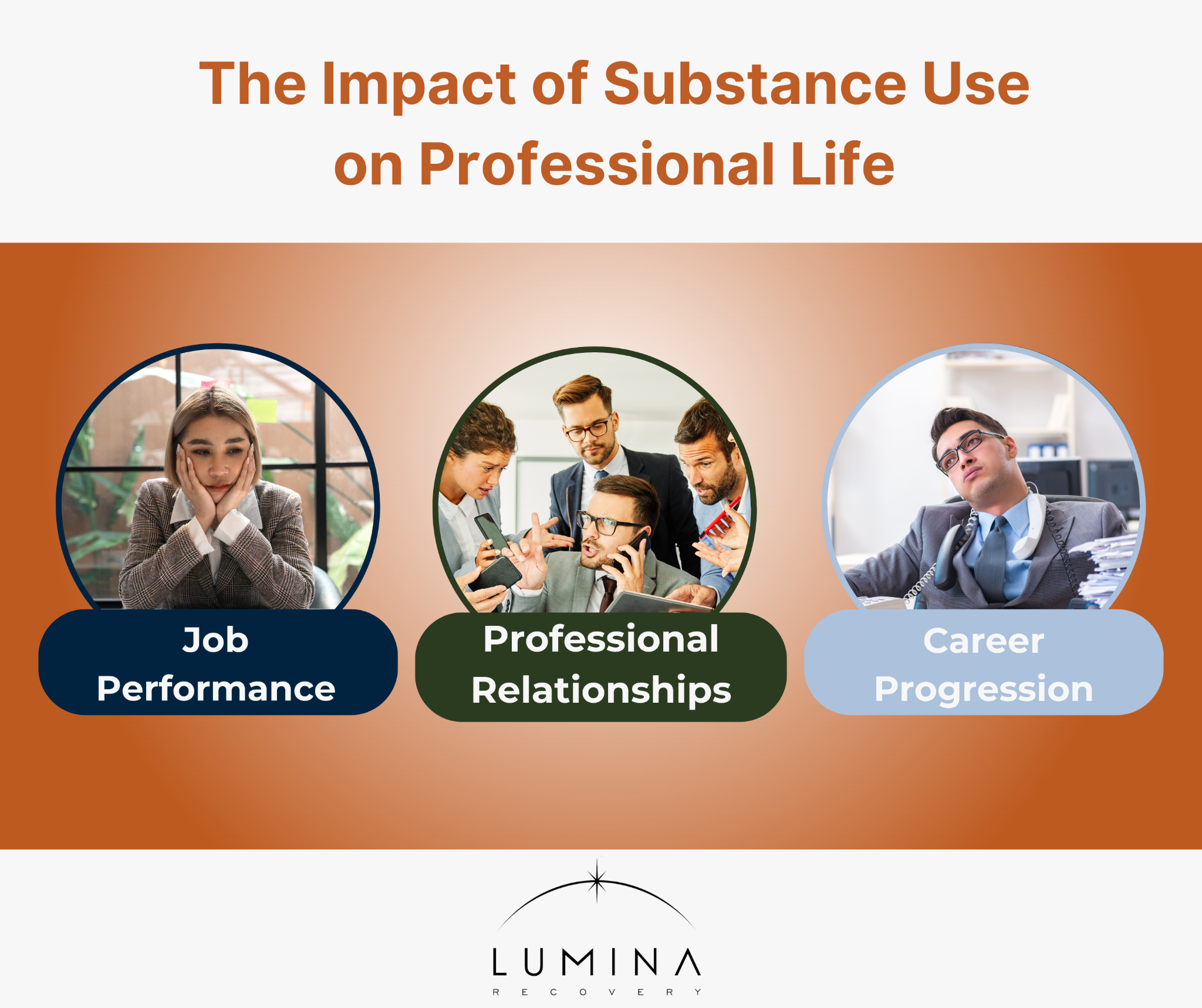Substance use in professional settings is more common than many realize. From high-pressure corporate environments to physically demanding industries, stress and workplace culture can sometimes contribute to unhealthy coping mechanisms.
The effects of substance abuse can significantly impact job performance, professional relationships, and long-term career stability. Understanding these consequences is essential for individuals and organizations aiming to maintain a healthy and productive workforce.
The Impact of Substance Use on Professional Life
Substance abuse at work affects not just the individual struggling but also their colleagues, supervisors, and overall workplace productivity. Understanding the full scope of its consequences is key to mitigating risks and ensuring a supportive work environment.
Job Performance
Substance abuse in the workplace can severely diminish job performance, leading to:
- Decreased productivity and efficiency. Substance use can impair cognitive function, focus, and motivation, making it difficult to meet work expectations.
- Increased errors and accidents. Impaired judgment and coordination increase the risk of mistakes and workplace accidents, particularly in industries like healthcare, construction, and transportation.
- Higher rates of absenteeism and presenteeism. Employees struggling with substance abuse at work may frequently call in sick, arrive late, or struggle to complete tasks efficiently.
Professional Relationships
Workplace relationships are built on trust and collaboration, both of which can suffer due to drug and alcohol abuse in the workplace:
- Strained relationships with colleagues and supervisors. Frequent absenteeism, erratic behavior, and mood swings can create tension and lead to isolation.
- Loss of trust and credibility. Missing deadlines, failing to meet expectations, and exhibiting unpredictable behavior can erode professional reputation.
- Workplace conflict and increased turnover. Substance use in the workplace can create conflicts between employees, leading to high turnover rates and a toxic work environment.
Career Progression
The long-term substance abuse effects can derail career advancement:
- Missed promotions and opportunities. Employers may hesitate to entrust important responsibilities to someone with inconsistent performance.
- Potential job loss and unemployment. Substance abuse impacts job security, as it can lead to termination, making re-employment more challenging.
- Legal and financial consequences. Many industries have strict policies against drug and alcohol use, leading to fines, lawsuits, or disbarment in extreme cases.
Recognizing the Signs of Substance Use Disorder
Identifying signs of substance use issues early can help prevent long-term career consequences. By recognizing the warning signs, individuals and employers can take proactive steps toward intervention and recovery.
Behavioral Indicators
- Frequent absenteeism or tardiness. Unexplained absences or showing up late frequently can signal substance use issues.
- Unexplained decline in work quality. Inconsistent or subpar performance, missed deadlines, and lack of focus can be red flags.
- Difficulty following workplace rules. Employees engaging in substance abuse at work may disregard workplace policies, putting themselves and others at risk.
Physical and Emotional Signs
- Noticeable changes in appearance. Sudden weight loss, poor hygiene, or bloodshot eyes can indicate substance misuse.
- Mood swings and irritability. Increased stress, aggression, or emotional withdrawal may suggest an underlying issue.
- Memory lapses and difficulty concentrating. Substance abuse impacts cognitive function, making it hard for employees to stay on task.
Steps to Address and Prevent Substance Use in the Workplace
Substance abuse in the workplace is a significant issue that requires both individual and organizational efforts to address. Taking proactive steps can help prevent addiction-related issues and create a healthier work environment for everyone.
Individual Strategies
- Seeking professional help and counseling. Therapy, medical support, inpatient treatment, and outpatient programs can help individuals regain control. Many treatment centers offer flexible scheduling to accommodate work commitments.
- Participating in recovery programs and support groups. Engaging with peer support groups and group therapy can provide crucial encouragement. Having a structured support system improves accountability and long-term success.
- Setting personal boundaries. Avoiding workplace events where substance use is encouraged and focusing on healthy stress management techniques such as exercise, meditation, and therapy can support sobriety.
- Developing healthy coping mechanisms. Managing workplace stress without turning to substances is crucial. Engaging in mindfulness practices, setting SMART goals, and prioritizing self-care can reduce the likelihood of relapse.
- Communicating with a trusted manager or HR representative. If an employee is struggling, having an open conversation with a supportive supervisor or HR professional can lead to valuable accommodations and assistance.
Organizational Policies
- Implementing employee assistance programs (EAPs). Companies offering confidential counseling and support can help employees struggling with addiction.
- Promoting a supportive and open workplace culture. Encouraging open dialogue about mental health and addiction reduces stigma and fosters support.
- Mandatory training on the effects of substance abuse. Educating employees on the dangers of substance abuse in the workplace can lead to early intervention.
- Random drug testing policies. In safety-sensitive industries, regular drug testing can help deter workplace substance use and promote accountability.
FAQs
How does substance use affect job performance?
Substance use can impair decision-making, memory, and focus, leading to decreased productivity, increased absenteeism, and higher accident rates.
Can I lose my job if I seek treatment for substance abuse?
Many companies offer Employee Assistance Programs (EAPs) and allow employees to seek treatment confidentially. The Americans with Disabilities Act (ADA) may also provide protections.
What are the signs that a colleague might be struggling with substance abuse?
Signs include frequent absences, noticeable changes in appearance, mood swings, and declining work performance.
How can substance abuse affect a person’s career?
Unaddressed substance use can result in missed promotions, job loss, and long-term career instability.
How does addiction affect work life?
Addiction can lead to strained professional relationships, decreased productivity, and workplace accidents, making it difficult to maintain steady employment.
Take Control of Your Career and Well-Being With Lumina Recovery
Addressing substance use early can prevent lasting damage to your career and professional reputation. Seeking help is a sign of strength, and with the right support, recovery is possible.
At Lumina Recovery, we offer outpatient treatment programs and dual diagnosis therapy to help professionals regain control of their lives while maintaining their careers.
If you or a loved one is struggling, reach out today to start your journey to lasting recovery.




